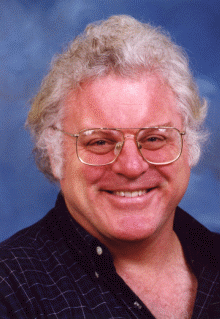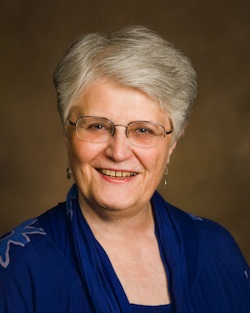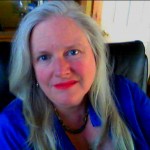FREE MP3 DOWNLOADS FOR THIS PROGRAM
Download/listen to Radio Ecoshock 130207 "How Will We Power the Future?" in CD Quality (56 MB) or Lo-Fi (14 MB)
Download/listen to the Robert B. Laughlin interview (38 min) in CD Quality (34 MB) or Lo-Fi (9 MB)
Download/listen to the Rose Cory interview (17 min) in CD Quality (15 MB) or Lo-Fi (4 MB)
Worried about prices at the pump? Or is it still way too cheap to save a livable climate? Even big fossil fuel executives wonder if we'll find enough energy, or retain an economy to pay for it. In just a minute, we'll encounter a powerful mind who drove through the options and calculations, to arrive at surprising conclusions about powering the future.
I'm Alex Smith. Later in this program, we'll talk with Dr. Rose Cory, lead author of a newly published paper. She found another surprise agent whipping up the production of greenhouse gases in the far North. It's yet another positivie feedback loop in the rapidly changing Arctic. About 24% of exposed land in the Northern Hemisphere is frozen under the surface. That empire of permafrost is disappearing quickly. Scientists estimate ten to twenty percent will melt in this century alone. The latest research says just 1.5 degrees Centigrade over pre-industrial levels will tip the permafrost into a vast melting process, unleashing more carbon dioxide than we have in the atmosphere now.
That is a recipe for climate disaster unseen for millions of years. We are already half way there.
I'll also play you a new song, from an upcoming tour of North America and Britain, by a hot new Australian band. It's good green music for your ears.
But first, this in-depth conversation with a surprising mind, about your energy future.
Listen to this Radio Ecoshock program right now.
ROBERT B. LAUGHLIN

Everone knows our civilization is doomed and our kids will be digging through the rubble, for cans of dogfood.
Apparently Nobel Laureate Robert B. Laughlin missed the memo. He wrote the book "". Laughlin is the Bass Professor of Physics at Stanford University, where he's taught since 1985. In 1998 he shared the Nobel Prize for Physics. His previous books are "Crime of Reason" and "A Different Universe".
This is Alex Smith for Radio Ecoshock. I read the book. I called Robert up to argue with him, and that's a big mistake, because he's smarter than I am. Anyway it's a trap. Robert Laughlin wants us to argue with him.
The old saying is "Don't jump to conclusions." But that is exactly what Lauglin did in writing this book. He presumed humans will find the energy needed in the future, and then figured out how. I stewed over this book, thinking "well he hasn't counted on an economic crash" or "where is the climate damage?"
Laughlin says he expects both. There could be an economic collapse, and serious climate damage. But, he says, humans are more or less the same generation after generation. There is no reason to expect out descendants will be very different from ourselves.
When Laughlin addresses student audiences all over the world, he asks them: "Will we still have cars? Will we still fly? Will there be electricity?" Eventually, they say "yes" - because they envision the same basic desire and need to travel, and to power things.
We get into an intriguing insider's look at all kinds of energy. For example, if Germany doesn't want nuclear power, they are saying "yes" to more Russian natural gas. But gas is still a greenhouse gas, it's limited, and supplies may drop quickly if we are depending on fracked gas. The jury is still out on how fast those fracked wells deplete.
Laughlin, who is at the Department of Physics at Stanford University, seems fairly impartial about nuclear power. After admitting he may have worked on classified nuclear programs (weapons?) - Laughlin says "we haven't had the nuclear conversation yet". Those decisions may come AFTER oil, gas and coal become hard to get and ridiculously expensive. New generations of humans may make very different decisions.
By the way, his Stanford students from Kazakhstan say the uranium trains that used to run to Moscow are now going to China. China has NOT backed away from nuclear energy, even after Fukushima.
We talk about the potential and pitfalls of solar energy. Laughlin is excited about the Andasol I project in Spain, where solar reflectors heat up a salt mixture to a liquid state. That acts like a battery which can store the sun's energy, to generate electricity via steam generators, even after the sun has gone down. Laughlin thinks the same technology could be used to store any kind of energy, even wind power. He's involved in a patent and a project to develop that.

Andasol I solar power station, Spain (courtesy of Wikipedia)
If you doubt what Laughlin says, be prepared to follow up through the last 81 pages of the book - his towering collection of end notes. If we just went through those, it should be worth a degree in itself.
The book "Powering the Future" is provocative, and crammed full of useful perspectives. It was a privilege to spend quality time with Robert Laughlin, and I hope you enjoy our talk as much as I did.
SUPPORT RADIO ECOSHOCK
You are tuned to Radio Ecoshock. This is my seventh year producing radio that matters for non-profit college and community stations around the world. You can help keep this big ball of ear waves going, by offering your support at our web site, ecoshock.org. Then share the blog, at ecoshock.info, and at radioecoshock.
Find your local radio station broadcasting Radio Ecoshock here.
NEW SCIENCE FROM THE ARCTIC - HOW SUNLIGHT CAN MAKE GREENHOUSE GASES
Now back to one of our specialties here, keeping you up to date with the latest climate science.
As Robert W. Service wrote: "There are strange things done 'neath the midnight sun." You are about to learn something new going on, powerful but unseen, in the melting far North. This is Radio Ecoshock. I'm Alex Smith.
In the past decade, satellites, scientists, and aboriginals looking at the Arctic find larger areas without snow cover, for longer periods . Arctic heating is greater than anywhere in the lower temperate zones.
A huge portion of planet Earth is frozen, we thought permanently frozen, calling it "permafrost". It's beginning to thaw, and we have fresh science showing new pathways for greenhouse gases to enter the atmosphere.

Dr. Rose Cory
Just out is this paper titled: "Surface exposure to sunlight stimulates CO2 release from permafrost soil carbon in the Arctic" It was published online in the Proceedings of the National Academy of Sciences on January 4, 2013. We have the lead author on the line, Rose M. Cory, Assistant Professor at the University of North Carolina, in Chapel Hill.
In a nutshell, this team of scientists discovered that lack of snow cover is leading to more greenhouse gases releases as sunlight stimulated microbial action on the formerly frozen plant matter of the permafrost.
Vast, I mean vast, Arctic plains in Siberia, the Canadian Arctic, and Alaska, are popping up with new lakes and puddles. These come from a process called "thermokarst" failures. Watch a short video about it here.
Picture a kind of slurry of organic material washing around in streams, run-off and ponds. The real news in this paper is a new actor: the role of sunlight itself. It isn't just the microbes feeding on newly released organic material. Sunlight itself can release greenhouse gases directly. Rose Cory describes how that works.
We knew that exposing more permafrost to the warming Arctic air would result in the release of more carbon dioxide and methane into the atmosphere. We just didn't understand how it worked, how much, or how fast. Now scientists have new figures to work with - including an estimate 40% higher than previously thought. That's a big number. Here is the quote from the paper:
"Our results suggest that photostimulation will rapidly (days to months) increase conversion to CO2 by an additional 40% or more in thawed and released C compared with that remaining in the dark, and that photo-stimulated bacterial use of this C in natural streams may equal or exceed its degradation in the dark alone."
Rose Cory confirms they have found yet another positive feedback loop in the Arctic - home to more than a half dozen feedback loops already. It's serious news we all need to understand, as formerly snow-covered lands become exposed to the warming Arctic sun.
Read about this new science in the New Scientist magazine here.
Rose says its "jarring" to return from the Arctic, where such major and dangerous changes are taking place, to here home in Chapel Hill North Carolina. Most people in the U.S. (and around the world for that matter) have no idea of the big developments in the Arctic. With your help, listeners, we can spread the word. Tell someone about this research, and make more people into "Arctic watchers".
Radio Ecoshock has a number of programs devoted to the melting permafrost, the disappearing sea ice, and loss of glacier ice on Greenland. I recommend our December 19th show, 2012 "Climate: the Arctic Thermostat Blows Up" and also in 2012, our February 15th program with 3 scientists "Arctic Emergency - Global Threat".
I also did a special from the February 2012 meeting of the American Academy for the Advancement of Science, titled "What If the Permafrost Thaws?"
Please listen and pass those links along.
OUR FEATURE SONG THIS WEEK: "NO SUCH THING AS WASTE" by the band Formidable Vegetable Sound System
A sustainability-based electroswing ukulele show all about permaculture called Formidable Vegetable Sound System is touring through Canada from Australia from May-August. Here are just some of the tour dates:
22nd April- U-Mass for Earth Day, Amherst, MA
26 June - Glastonbury Festival, UK
27 July - Secret Garden Party, UK
2 Aug - Bass Coast Festival, BC, Canada
7 Aug - Shambhala Festival, BC, Canada
If you check out this You tube video, the audience is swaying and dancing.
The album will be launched worldwide on April 6 (with a launch party being held at Ceres Community Environmental Park in Melbourne, Australia.)
Anyone interested in buying the album pre-sale can head to permaculturesongs.com or (Permaculture Ukulele)
IF ONLY WE COULD SEE IT...
The process that might do our civilization in is happening right in your city or region. If we had eyes to see gases, we'd see the carbon and methane pouring up into the sky, from our streets, homes, factories, and farms. Billowing clouds of climate change in the making, and very little human change on the ground. Check out a camera technology that makes greenhouse gas emissions visible in this ABC News piece.
Still, green nature pops up in the cracks of the sidewalk. In coming programs we'll cover action in the big picture, and ways a million longing hearts can steer in a different direction, including me, including you.

I'm Alex Smith. Thank you for listening to Radio Ecoshock again. Please support the program, spread the word, and join me again next week.





